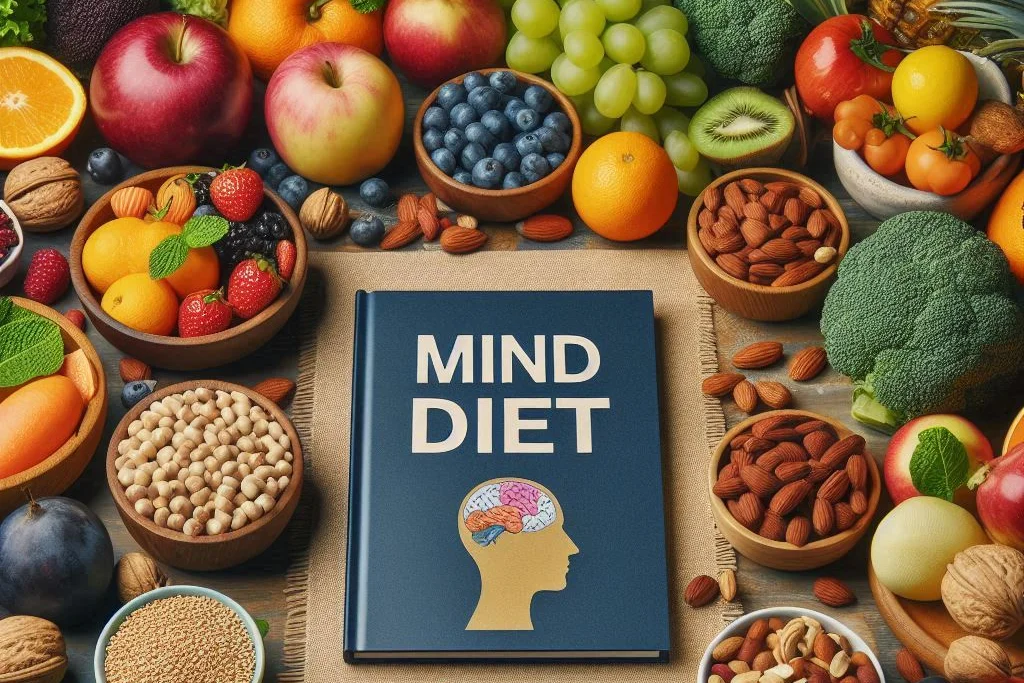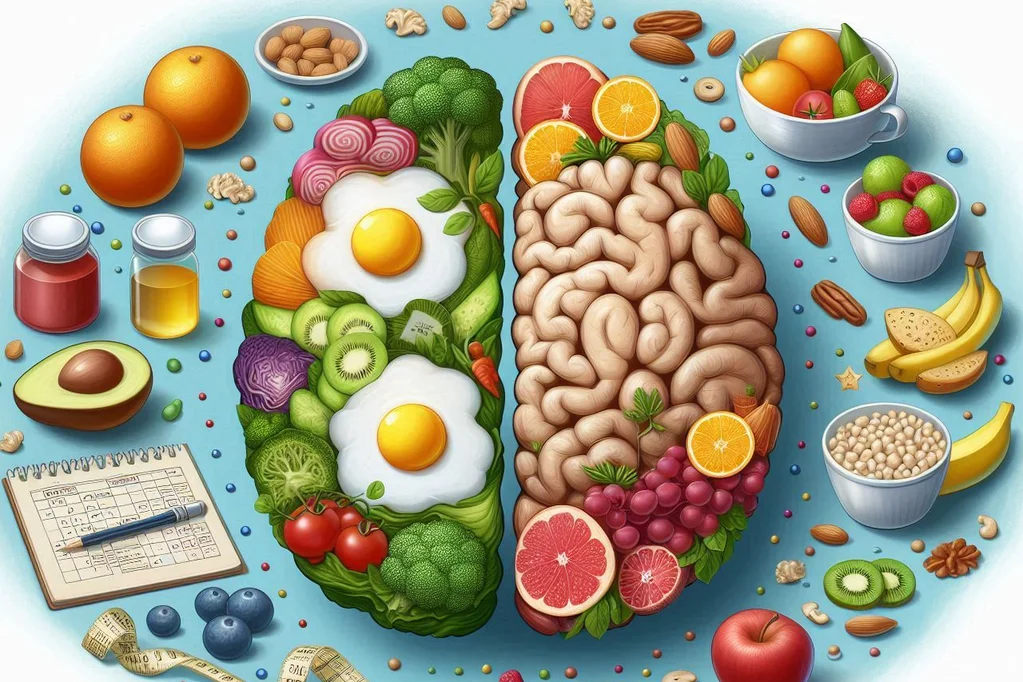Diet Guide – MIND Diet
Wondering how to protect cognitive health naturally? Explore the MIND diet’s proven benefits and simple tips to support brain function daily!

This article is part of a series. Check them out all!
Supporting Brain Health with the MIND Diet
Cognitive impairment involves challenges with memory, learning, or thought processing. While often perceived as a typical part of aging, such decline is not an unavoidable outcome.
“Although many people may consider this a normal part of aging, it is not inevitable”
In 2021, Alzheimer’s disease—known to contribute to cognitive deterioration—ranked sixth among the leading causes of death in the United States.
These statistics highlight the importance of prioritizing brain health through proactive lifestyle choices, including dietary patterns.
The MIND diet, a combination of the Mediterranean and DASH (Dietary Approaches to Stop Hypertension) diets, has demonstrated potential in reducing the risk of cognitive decline. Through simple nutritional adjustments, brain function may be supported, and the risk of Alzheimer’s disease may be lowered.
Understanding the MIND Diet for Cognitive Support

The MIND diet was developed by integrating elements from the DASH and Mediterranean diets. Research has indicated that these dietary approaches may contribute to the preservation of cognitive abilities. This led to the creation of the MIND diet—short for Mediterranean-DASH Intervention for Neurodegenerative Delay—by Martha Clare Morris.
The Mediterranean diet is centered around grains, legumes, vegetables, fruits, nuts, and fish, with modest portions of meat, eggs, dairy, and alcohol also included. In contrast, the DASH diet places emphasis on fruits, vegetables, and low-fat dairy, while also incorporating whole grains, poultry, fish, and nuts, and advising reduced consumption of saturated fats, red meats, and sugars.
The MIND diet blends both approaches by promoting a high intake of plant-based foods, alongside fish and poultry, while limiting saturated fats and added sugars. What distinguishes this dietary pattern is its focus on both daily and weekly targets for specific food types.
One example includes a recommendation of at least two servings of vegetables each day, with a focus on incorporating leafy greens at least once daily.
Findings suggest that adherence to the MIND diet may reduce the risk of Alzheimer’s disease by approximately 53% with strict compliance, or 35% with moderate adherence.
“Evidence suggests that the MIND diet can help lower Alzheimer’s disease risk by about 53% or 35%, depending on whether a person follows the diet strictly or moderately well.”
Although further study is needed to strengthen these conclusions, this dietary approach is viewed as a potentially effective method for promoting cognitive health. Prior to making significant dietary adjustments, professional medical consultation is recommended.
Purpose of the MIND Diet in Brain Health

The primary aim of the MIND diet is to support brain function and strengthen cognitive resilience
particularly in older populations. Research has shown that adopting a high-quality diet, as part of a healthy lifestyle, may offer significant benefits for brain health.
“Evidence notes that healthy lifestyle factors, such as a high quality diet, can provide health benefits”
By following this dietary pattern, a potential slowing of cognitive decline and a reduced likelihood of developing Alzheimer’s disease and dementia may be achieved.
A 2022 study highlighted a connection between stronger adherence to the MIND diet and a reduced risk of dementia.
A similar conclusion was reached in a 2021 study, which observed improvements in cognitive function scores among individuals considered at higher risk.
Incorporated alongside regular physical activity and cognitive training, this dietary approach may serve as a valuable strategy in the prevention of dementia.
Further findings suggest that, following a stroke, closer adherence to the MIND diet may be linked to a slower progression of cognitive decline.
Potential Benefits of the MIND Diet
The MIND diet has been associated with a variety of health benefits. Alongside its role in lowering the risk of Alzheimer’s disease, it may also support cardiovascular health and offer protection against certain types of cancer.
Many contributing factors have been linked to the development of Alzheimer’s disease. While aspects such as age and genetics remain beyond control, other lifestyle-related elements—like nutrition, physical activity, and cognitive engagement—can be managed.
Both the Mediterranean and DASH
diets have demonstrated potential for supporting heart health. Since the MIND diet combines principles from both, similar cardiovascular benefits may be expected.
A 2021 study also noted an association between adherence to the MIND diet and a reduced risk of breast cancer.
While more investigation is needed to confirm links between dietary choices and cancer prevention, early findings suggest the MIND diet may play a meaningful role in long-term health.

Considerations and Risks of the MIND Diet
Despite its general safety, individual health needs can vary. Some foods encouraged by the MIND diet may not be suitable for all individuals due to allergies, intolerances, or personal dietary restrictions. In such cases, guidance from a healthcare provider or registered dietitian is often recommended to ensure nutritional needs are met while aligning with the principles of the MIND diet.
Recommended Foods in the MIND Diet
The MIND diet outlines 15 dietary components, with a focus on promoting brain health by encouraging the intake of 10 specific food categories.

| Frequency | Food Group | Examples | Recommendation |
|---|---|---|---|
| Every Day | Whole Grains | Oatmeal, quinoa, brown rice, whole wheat bread/pasta | 3 servings/day |
| Leafy Green Vegetables | Spinach, kale, collards, arugula, mixed greens | 1 serving/day | |
| Other Vegetables | Non-starchy: broccoli, carrots, bell peppers, tomatoes | 1 serving/day | |
| Red Wine (optional) | 5 oz. glass | 1 glass/day (if appropriate) | |
| Most Days (5–6x/week) | Leafy Green Vegetables | Extra servings beyond daily requirement | 6 times/week |
| Nuts | Almonds, walnuts, pistachios, cashews (¼ cup) | At least 5 times/week | |
| Olive Oil | For cooking and salads | Use as primary oil | |
| Every Other Day | Beans/Legumes | Lentils, black beans, chickpeas, soybeans | At least 3 times/week |
| Twice a Week | Berries | Blueberries, strawberries (1 cup) | 2 times/week |
| Poultry | Chicken or turkey (skinless, grilled, baked) | 2 times/week | |
| Once a Week | Fish (Fatty) | Salmon, tuna, sardines, trout, mackerel | 1 time/week |
Foods to Limit on the MIND Diet

The MIND diet includes guidance on foods that should be limited to support long-term brain health. While complete avoidance may not always be practical, reduced consumption is advised whenever possible.
| Frequency | Food Group | Examples | Recommendation |
|---|---|---|---|
| Limit/Avoid | Butter/Margarine | Less than 1 tbsp/day | |
| Pastries & Sweets | Cakes, cookies, candy | Less than 5 times/week | |
| Red Meat | Beef, pork, lamb | Less than 4 times/week | |
| Fried Foods & Full-Fat Cheese | Fried chicken, fries, cheddar, mozzarella, etc. | Less than 1 time/week |
Sample One-Week Meal Plan
| Day | Breakfast | Lunch | Dinner |
|---|---|---|---|
| Day 1 | Greek yogurt with raspberries, topped with sliced almonds | Mediterranean salad with olive-oil dressing, grilled chicken, whole-wheat pita | Burrito bowl with brown rice, black beans, fajita vegetables, grilled chicken, salsa, guacamole |
| Day 2 | Wheat toast with almond butter, scrambled eggs | Grilled chicken sandwich on whole-wheat bread, blackberries, and carrots | Grilled salmon, side salad with olive-oil dressing, brown rice |
| Day 3 | Steel-cut oatmeal with strawberries, 2 hard-boiled eggs | Mexican-style salad with mixed greens, black beans, red onion, corn, grilled chicken, olive-oil dressing | Chicken and vegetable stir-fry, brown rice |
| Day 4 | Greek yogurt with peanut butter and banana | Baked trout, collard greens, black-eyed peas | Whole-wheat spaghetti with turkey meatballs and marinara, side salad with olive-oil dressing |
| Day 5 | Whole-wheat toast with avocado, omelet with peppers and onions | Chili with ground turkey, sweet potatoes, onion, bell peppers | Greek-seasoned baked chicken, oven-roasted potatoes, side salad, whole-wheat dinner roll |
| Day 6 | Overnight oats with strawberries | Fish tacos on whole-wheat tortillas, brown rice, pinto beans | Chicken gyro on whole-wheat pita, cucumber and tomato salad |
| Day 7 | Vegetable frittata, sliced apple, peanut butter | Tuna salad sandwich on whole-wheat bread, carrots and celery with hummus | Curry chicken, brown rice, lentils |
